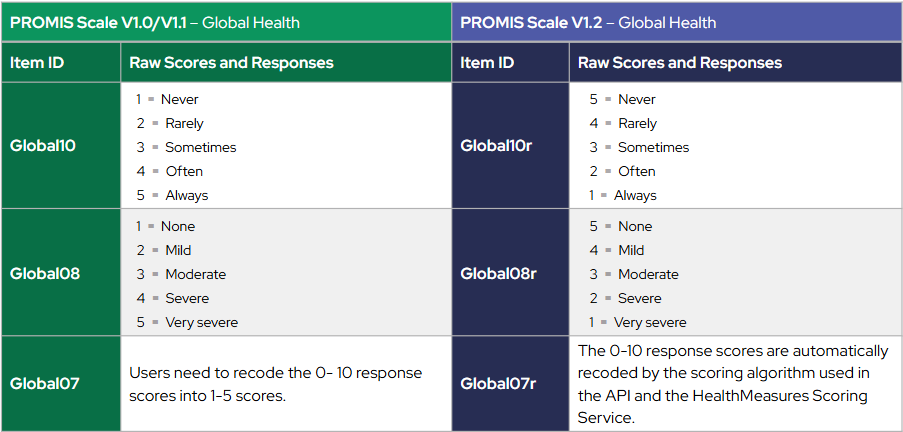PROMIS Global Health Overview
The PROMIS Global Health is an overall evaluation of an adult (ages 18+) patient’s physical and mental health. The measure is generic rather than disease-specific and looks at a patient’s general health. There is only a fixed-length version consisting of 10 questions and is available at healthmeasures.net.
All versions of the PROMIS Global Health produces a Global Physical Health (GPH) and Global Mental Health (GMH) scoring component. There is not an overall PROMIS Global Health score. PROMIS also has shorter measures that will provide the GPH and GMH scores: Global Mental 2a and Global Physical 2a. These shorter measures produce scores that are less precise than the PROMIS Global Health.
Utilizing the T-score lookup algorithm (which CODE utilizes) all three version scores can be compared.
PROMIS Global Health Versions
There are three published versions of the measure:
- 1.0
- 1.1 (CODE implemented)
- 1.2 (Recommended)
The text of the questions and answers in all three versions are identical, except in version 1.1 and 1.2. ‘In the past 7 days’ associated with Global09 was removed, and the questions number was renamed to Global09r.
Version 1.2 was constructed to enable automatic Item Response Theory scoring. The following changes were made to enable that scoring.
- Global07, Global08, and Global10 were renamed to Global07r, Global08r and Global10r.
- Score values have been reversed to 5=None to 1=Very severe from the original version of 1=None to 5=Very severe.
- The scoring algorithm was changed so that users did not need to reverse the answer scores for Global08r and Global10r.
- Global07r responses can be submitted to the scoring algorithm with 0-10 responses and the scoring algorithm converts the scores automatically into 1-5 scores.
The table below outlines the differences in the versions.





